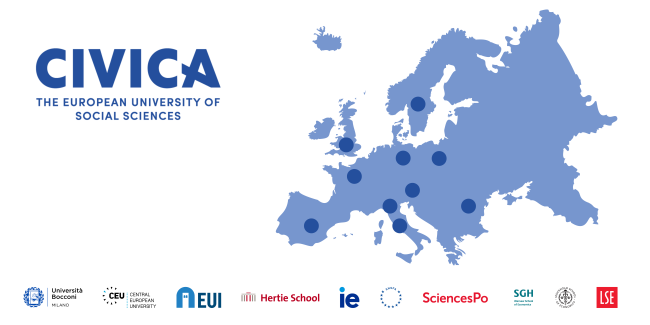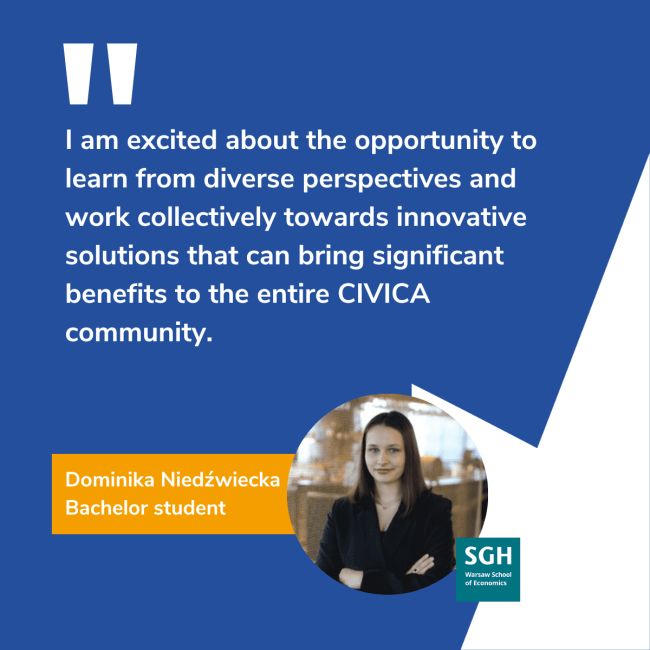The SGH membership in CIVICA alliance is a new level of our international academic cooperation. It brings innovative educational and civic engagement opportunities to our students. They will have a chance to complete additional international exchanges as well as special teaching projects conducted jointly with CIVICA universities.

About CIVICA
Since its founding in 2019 by leading European social science universities, CIVICA has worked to establish a truly European inter-university campus. In doing so, it has piloted EU’s flagship initiative to enhance strategic partnerships in European higher education and research. CIVICA members have drawn on their joint expertise and shared European values to offer students and staff innovative, transnational opportunities in education, research and civic engagement, with special emphasis on digital innovation and an overarching mission to serve European societies.
CIVICA’s vision
Together with our CIVICA partners, we aim to:
- deepen and expand activities in key areas such as education, research, service to society, innovation and lifelong learning;
- develop a diverse and inclusive CIVICA community;
- establish CIVICA’s lead role in the social sciences with further global outreach;
- and set up a framework for sustainable institutional cooperation.
CIVICA embodies our ambition, as forward-thinking higher education institutions, to assume our civic responsibility as Europeans towards both future European generations and the role of Europe in the world.
CIVICA’s mission
CIVICA will continue to serve local and global communities, defend core European values, foster environmental sustainability, and advance policy-relevant research in the social sciences. Yet, the focus will remain on the alliance’s internal communities. Between autumn 2022 and autumn 2026, thousands of students and (post)doctoral researchers are expected to benefit from enhanced mobility, new and expanded joint educational offers, and Europe-wide opportunities for civic engagement and extracurricular activities. In the face of evolving political contexts, CIVICA strives to build bridges between academia and civil society, while acting as a model of sustainable institutional cooperation and providing a stable and inclusive environment in which the values of autonomy and academic freedom are defended.
Partner institutions in the alliance
CIVICA’s members are:
- BOCCONI UNIVERSITY (ITALY)
- CENTRAL EUROPEAN UNIVERSITY (AUSTRIA)
- EUROPEAN UNIVERSITY INSTITUTE (INTERGOVERNMENTAL)
- HERTIE SCHOOL (GERMANY)
- IE University (Spain)
- NATIONAL UNIVERSITY OF POLITICAL STUDIES AND PUBLIC ADMINISTRATION (ROMANIA)
- SCIENCES PO (FRANCE)
- SGH Warsaw School of Economics (Poland)
- STOCKHOLM SCHOOL OF ECONOMICS (SWEDEN)
- THE LONDON SCHOOL OF ECONOMICS AND POLITICAL SCIENCES (United Kingdom)

Ongoing recruitment of students, PhD students and faculty for CIVICA projects and initiatives:
CIVICA Teacher Development Programme
7th call for faculty short visits [Apply by April 15, 2025]
Log in to myCIVICA platform and keep up to date with current projects and inciatives
More about CIVICA
- CIVICA Joint Course
The course Governance and Key Actors in Migration and Integration – a Multidisciplinary Perspective (CIVICA Joint Course) - sygnature 13A0XC-1356 is the first course offered at the undergraduate level at SGH Warsaw School of Economics, which will be taught jointly by Dr Marta Pachocka from SGH and Prof. Laurence Romani from the Stockholm School of Economics (SSE).
The course focuses on the issues of migration and integration in today’s Europe and the European Union (including Poland and Sweden), taking into account the approaches of political science, sociology, economics and management. In our classes, we look at migration processes and their multidimensional effects, as well as the governance of migration and integration. We pay close attention to the role of key actors in this area from the public, societal and private sectors. We learn how to use reliable and accurate data on migration and how to distinguish facts from myths. We explore the most important theoretical approaches and current literature on the subject. We familiarise ourselves with the basic legal acts and official documents. We work with materials published by international organisations (such as IOM, UNHCR, OECD, EU) and social organisations. We use various quantitative databases provided by Eurostat, ministries and offices specialising in migration issues.
Our classes have an important practical dimension – in addition to co-lecturers, we invite other experts and practitioners from NGOs, international organisations, local authorities and migrants themselves.
Classes are interactive – students have the opportunity to discuss with invited guests, and the basis for validation and evaluation is group work on specific cases and topics as part of small research projects.
A detailed description of the course topics and the semester plan can be found in the syllabus available in the Virtual Dean’s Office (after logging in).
These classes will give Bachelor’s degree students the opportunity to earn 3 ECTS credits towards their free-choice subjects. Due to the need to adapt to the differences in the organisation of the semester at SGH and SSE, classes at SGH will be held in a hybrid or online format from the end of October to mid-December 2025 (classes’ dates will be available in the schedule published on the Dean’s Office’s website at a later date).
We encourage you to sign up for the course Governance and Key Actors in Migration and Integration – a Multidisciplinary Perspective (CIVICA Joint Course) during the ongoing semester declarations for the fall semester 2025/2026.
If you have any additional questions, please contact Dr Marta Pachocka: mpachoc@sgh.waw.pl
Description of course topics and semester plan in the Virtual Dean’s Office (after logging in).
You can sign up for our classes between 6 and 12 May during the semester declarations in the Virtual Dean’s Office.
We invite you for an information session, where we will briefly talk about CIVICA Joint Course on „Governance and Key Actors in Migration and Integration – a Multidisciplinary Perspective” and answer your questions (15 April, 2025 at 3.20 p.m.)
- CIVICA Ambassadors
CIVICA Ambassadors range from undergraduate students to postdoctoral researchers, and represent each university in the alliance. Their role is to promote interaction and exchange within the alliance’s communities, and be a first point of contact to CIVICA for their peers.
The Ambassadors network actively shapes CIVICA by initiating bottom-up projects and participating in formal and informal alliance activities.
Meet CIVICA Ambassadors at SGH for the academic year 2024/25
Dominika Niedźwiecka, Bachelor student

“I’am excited about the opportunity to learn from diverse perspectives and work collectively towards innovative solutions that can bring significant benefits to the entire CIVCA community” – Dominika Niedźwiecka, bachelor student, SGH Warsaw School of Economics.
Cezary Pendras, bachelor student

“CIVICA cultivates lifelong relationships with fascinating individuals from around the globe, equipping us with the skills and insights necessary to effectinely address global challenges in our future careers” – Cezary Pendras, bachelor student, SGH Warsaw School of Economics.
- CIVICA Student Engagement Fund
The Student Engagement Fund (SEF) is a mini–grant funding scheme aimed at supporting student– or early–stage researchers (ESR)–led joint initiatives within the CIVICA alliance. It aims to foster cross–campus collaboration among students, student associations and ESR from different disciplines and backgrounds in tackling the important issues facing Europe today, and to further enhance the students’ experience within the alliance.
We will publish the recruitment results for the program soon.
Watch a short movie about the programme:
- CIVICA Student and Early-Stage Researcher Board
CIVICA Student and Early-Stage Researcher Board
Student and ESR Board represents the voice of CIVICA students and early-stage researchers in all areas of the CIVICA Alliance, particularly those relevant to them, such as student mobility, course offerings, research initiatives, the digital campus, library services, outreach activities, and non-curricular activities.
It works closely with CIVICA Ambassadors to create a real impact and positive change for student engagement within the Alliance. Moreover, CIVICA aims to further engage students and researchers in the governance and implementation of its activities and encourage bottom-up initiatives that strengthen interaction and collaboration within the Alliance.
Read more and meet the Members of CIVICA Student and Early-Stage Researcher Board
- Information materials on the university alliance
- More about Civica in our media
CIVICA gets greenlight from the European Commission: the university alliance continues its expansion
CIVICA EMBARKS ON A NEW ABITIOUS PHASE
CIVICA acting with SGH students in mind
An easy guide to CIVICA – The European University of Social Sciences
- PhD Clinic
The PhD Clinic serves as an arena in which doctoral researchers can identify faculty at CIVICA partner universities whose expertise is relevant to their respective dissertation topics. The clinic is a medium to ease communication between researchers and faculty by giving researchers the chance to contact professors via an in-built email system.
- Sign up to the CIVICA NEWSLETTER
Sign up to the CIVICA NEWSLETTER to receive the latest opportunities, news and events from CIVICA alliance.
